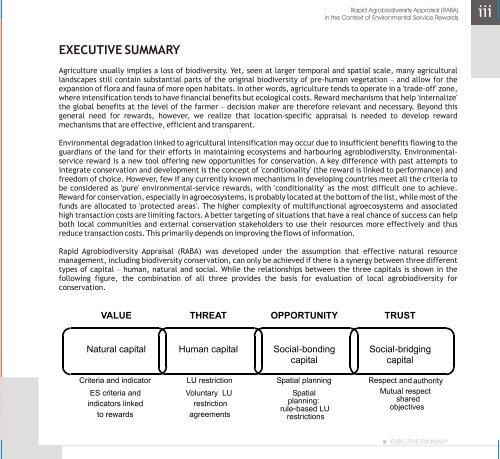Rapid Agrobiodiversity Appraisal (RABA) - Are you looking for one ...
Rapid Agrobiodiversity Appraisal (RABA) - Are you looking for one ...
Rapid Agrobiodiversity Appraisal (RABA) - Are you looking for one ...
You also want an ePaper? Increase the reach of your titles
YUMPU automatically turns print PDFs into web optimized ePapers that Google loves.
EXECUTIVE SUMMARY<br />
Agriculture usually implies a loss of biodiversity. Yet, seen at larger temporal and spatial scale, many agricultural<br />
landscapes still contain substantial parts of the original biodiversity of pre-human vegetation – and allow <strong>for</strong> the<br />
expansion of flora and fauna of more open habitats. In other words, agriculture tends to operate in a 'trade-off' z<strong>one</strong>,<br />
where intensification tends to have financial benefits but ecological costs. Reward mechanisms that help 'internalize'<br />
the global benefits at the level of the farmer – decision maker are there<strong>for</strong>e relevant and necessary. Beyond this<br />
general need <strong>for</strong> rewards, however, we realize that location-specific appraisal is needed to develop reward<br />
mechanisms that are effective, efficient and transparent.<br />
Environmental degradation linked to agricultural intensification may occur due to insufficient benefits flowing to the<br />
guardians of the land <strong>for</strong> their ef<strong>for</strong>ts in maintaining ecosystems and harbouring agrobiodiversity. Environmentalservice<br />
reward is a new tool offering new opportunities <strong>for</strong> conservation. A key difference with past attempts to<br />
integrate conservation and development is the concept of 'conditionality' (the reward is linked to per<strong>for</strong>mance) and<br />
freedom of choice. However, few if any currently known mechanisms in developing countries meet all the criteria to<br />
be considered as 'pure' environmental-service rewards, with 'conditionality' as the most difficult <strong>one</strong> to achieve.<br />
Reward <strong>for</strong> conservation, especially in agroecosystems, is probably located at the bottom of the list, while most of the<br />
funds are allocated to 'protected areas'. The higher complexity of multifunctional agroecosystems and associated<br />
high transaction costs are limiting factors. A better targeting of situations that have a real chance of success can help<br />
both local communities and external conservation stakeholders to use their resources more effectively and thus<br />
reduce transaction costs. This primarily depends on improving the flows of in<strong>for</strong>mation.<br />
<strong>Rapid</strong> <strong>Agrobiodiversity</strong> <strong>Appraisal</strong> (<strong>RABA</strong>) was developed under the assumption that effective natural resource<br />
management, including biodiversity conservation, can only be achieved if there is a synergy between three different<br />
types of capital – human, natural and social. While the relationships between the three capitals is shown in the<br />
following figure, the combination of all three provides the basis <strong>for</strong> evaluation of local agrobiodiversity <strong>for</strong><br />
conservation.<br />
VALUE THREAT OPPORTUNITY TRUST<br />
Natural capital Human capital Social-bonding<br />
capital<br />
Criteria and indicator LU restriction Spatial planning<br />
ES criteria and<br />
indicators linked<br />
to rewards<br />
Voluntary LU<br />
restriction<br />
agreements<br />
Spatial<br />
planning:<br />
rule-based LU<br />
restrictions<br />
<strong>Rapid</strong> <strong>Agrobiodiversity</strong> <strong>Appraisal</strong> (<strong>RABA</strong>)<br />
in the Context of Environmental Service Rewards<br />
Social-bridging<br />
capital<br />
Respect and authority<br />
Mutual respect<br />
shared<br />
objectives<br />
EXECUTIVE SUMMARY<br />
iii

















![CynefinFramework final [Read-Only]](https://img.yumpu.com/19017304/1/190x135/cynefinframework-final-read-only.jpg?quality=85)